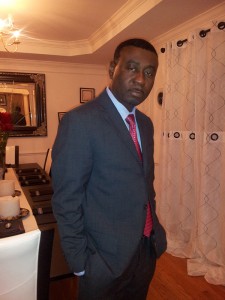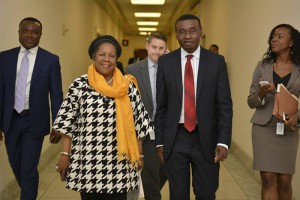
On July 20th, President Muhammadu Buhari of the Federal Republic of Nigeria started a three-day Washington visit, which included a meeting with President Barack Obama, Secretary of State John Kerry, and other officials.

Executive Director of the
Nigerian-American Leadership Council
During President Buhari’s visit in Washington, MEA spoke with Mr. Sam Okey Mbonu, Executive Director of the Nigerian-American Leadership Council (NAL Council), in Washington, to discuss the Council’s mission and the importance of Nigeria for the US business community.
Mbonu is a Washington-based professional with expertise in Nigeria and US-Nigeria relations. His career path included a JD from the District of Columbia School of Law and advanced training in commercial law at American University, Washington College of Law Washington DC. His stint in public Service included serving as former Commissioner, Housing & Community Development in Maryland, private sector experiences spanning transactions in Housing & Infrastructure development among others; and various international transactions from Washington to Beijing and to Nigeria. Mbonu is passionate about data-driven policy and initiatives that spur investment into Nigeria.
Mbonu co-founded the Nigerian-American Leadership Council (NAL Council). The Council is the Washington think-tank that provides some of the most authentic policy advisory to US institutions and public agencies, as well as business intelligence to US Corporations, which are entering the vast Nigerian and West African market. The Council bases its advisories and business intelligence on the Council’s real ties to US and Nigeria public and private sectors operatives, and to its access to experts in the US and Nigeria.
The Obama Administration has made it clear that the United States wants to be part of the African story. These efforts are both strategic and telling of the world’s focus on Africa and what its future holds. By 2050, a quarter of the world’s population will live in Africa, according to a United Nations population forecast. The forecast also projects that Nigeria will be the third most populated country in the world. Analysts have dubbed the Federal Republic of Nigeria, an attraction to investors, corporations and foreign governments.
The Washington visit of the newly elected President Buhari comes as a rewarding culmination after years of efforts by the Council, to not only support free and fair elections, but also the rejuvenation of US – Nigeria relations.
In May, a few months after Nigeria’s March 28th presidential election, the Council and the Office of Congresswoman Sheila Jackson Lee, hosted a town-hall discussion about Nigeria’s future. Tagged “Beyond the Ballot,” the event highlighted current support by the United States government towards the security concerns in northern Nigeria, while offering solutions in the sectors of technology, energy, and education.
“The democratic exercise of selecting a president is just the beginning, not the end,” said Mbonu. “We now need policies and structure that prevents instability and encourages growth.”
In 2013, before major news networks were reporting on violence in northern Nigeria, the Council hosted an International Security Conference to analyze the Boko Haram (BH) insurgency, and to proffer solutions to the rising threat of BH. The conference addressed the then rising, Boko Haram activities and declared the urgency in declaring Boko Haram as a Foreign Terrorist Organization (FTO) in accordance with section 219 of the Immigration and Nationality Act (INA).
“Shortly after the conference, the U.S. government finally proscribed Boko Haram as an FTO,” said Mbonu.

Following the conference, the Council conducted a media blitz, with Mbonu speaking on domestic and international news networks, advocating for multinational cooperation to defeat Boko Haram and mend the weak points that enables the organization to exist.
Despite security issues and instability in the north, the Federal Republic of Nigeria is considered a promising market in Africa. The rebasing of Nigeria’s economy in 2013, raised its GDP to $510 billion, at bout $2,700 per capita, making it the largest economy in Africa. With excitement, Mbonu described the growth potential in Nigeria.
“The Nigerian market is expanding faster than freshly-baked bread in the oven,” said Mbonu. “Industries like agriculture are very much untapped, which presents so many possibilities. The opportunities are endless.”
Awareness of Africa’s growth, and the opportunities in Nigeria has encouraged and motivated an increase business activity. The level of greenfield foreign direct investment into Nigeria has increased at a compound rate of almost 20% since 2007, according to a 2014 World Economic Forum on Africa report.
The heightened interest in Nigeria has given the Council new pathways for meeting the needs of business owners and those seeking information and in-country partners. Mbonu attributes the Council’s ability to provide effective business and policy advisement, to a team with in-depth experience in both the United States and Nigeria.
“Members of our advisory board have served at high-level positions within the US federal agencies, international NGOs, and Nigerian federal and local governments,” said Mbonu.”
Time will reveal the results of the Obama Administration’s policy on Africa and how effectively it has strengthened relations with Nigeria, and other African nations. The Nigerian-American Leadership Council plans to increase its partnerships and consultation to investment groups, corporations and entrepreneurs.
“In the next five years, we want to be a catalyst for the mutually beneficial relationship between the governments, and people of the United States and Nigeria,” said Mbonu.
